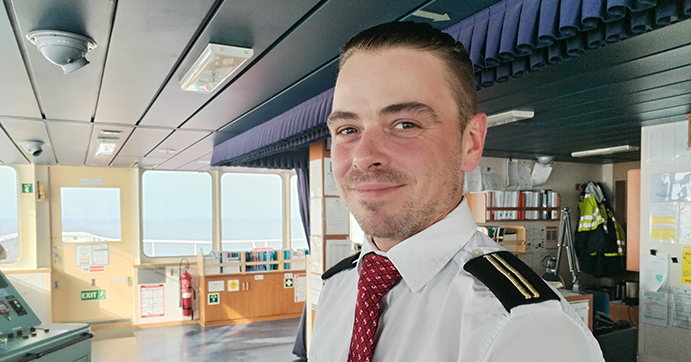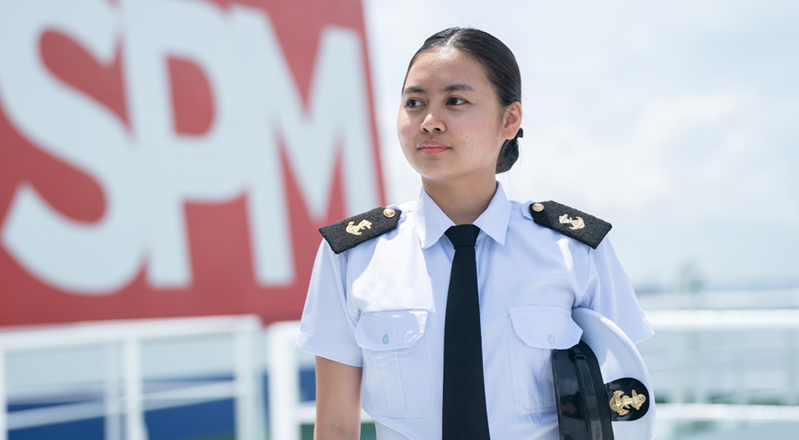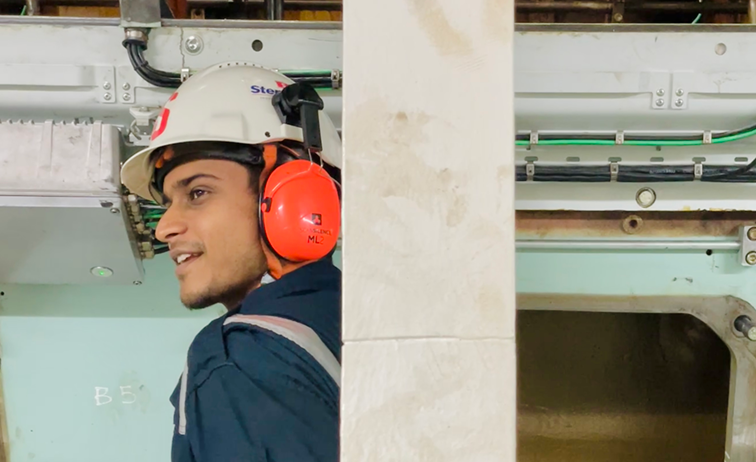NMG Ship Management Ltd
Highly tailored ship and offshore asset management
Visit northern-marine.com
6th Sep 2024
As the first rank in the seafarer profession, the Cadet is often considered as the “novice” or “inexperienced” amongst other crew members onboard.
And while this may be true from a professional perspective, behind every Cadet is an unseen personal experience that has shaped a potential future leader.
We interviewed four Northern Marine Cadets who have experienced very different personal routes to become seafarers.
Each unique journey provides a fascinating reminder that Cadets onboard a vessel may well have lived-experiences very different from senior colleagues onboard.
Riya Rose Martin hails from a quaint village called Annamanada, nestled in the Indian state of Kerala. Riya experienced a relative peaceful childhood until the age of nine when a horrific incident would send her young life into a period of turmoil. It was during this extended time of difficulty that Riya forged a resilience which she has taken into her cadetship.
Riya explained: “I must admit, I was never particularly ambitious, preferring to embrace life as it unfolded. My existence was relatively tranquil until the age of nine, when I encountered a significant challenge that demanded a crucial decision.
“Regrettably, I experienced an unfortunate accident that resulted in a severe third degree burn to my foot when I fell into a pit of fire and remained there for a few distressing minutes before being rescued where I vividly recall screaming at the top of my lungs.
“Despite the excruciating pain, which was almost unbearable, I recall feeling a strange sense of amusement at my ability to endure it, as I have never been particularly tolerant of discomfort. Subsequently, accompanied by my deeply distressed parents, I was taken to multiple hospitals, seeking expert opinions.
“The consensus among the medical professionals was grim: amputation of my leg from the knee to the foot was deemed necessary to prevent potential paralysis or even fatal consequences. Faced with this life-altering decision, my parents displayed remarkable resilience and refused to succumb to despair. It was at that moment that I grasped the profound impact this decision would have on my life, and I resolved not to surrender to adversity.
“Despite the uncertainty and scepticism expressed by those around me, including doubts and judgement directed towards my parents, we embarked on a quest to find a promising cure. Fortunately, my parents’ efforts were rewarded, and the treatment proved remarkably effective, akin to a miraculous intervention.
“I experienced significant difficulty in walking for nearly a year and a half. I persevered, often relying on the compassionate individuals. As I approached the age of thirteen, driven by a desire to embrace normalcy and test my capabilities, I participated in the selection trials for the 800-meter race.
“Understandably, I was unable to complete even a 100-meter segment, which came as no surprise to most observers. This marked the second occasion on challenging myself. Possibly, the instructors demonstrated compassion by permitting my participation in the actual race despite initial scepticism.
“Initially, the majority of the spectators found humour in my participation, but their amusement soon transformed into astonishment as I unexpectedly secured the third position. This accomplishment remains deeply cherished memory in my heart, not solely due to the position achieved, but rather the personal triumph of surpassing my own expectations. My parents expressed both pride and joy, which served as my profound gratitude for their courageous decision and unwavering commitment. During the subsequent years, I actively participated in various sports, including long-distance running, which resulted in a growing collection of accolades.
“The decisions I made since the age of nine could have led to adverse outcomes, yet they consistently turned out to be the most favourable choices I have ever made. The unwavering support of my parents regardless of the complexity of my circumstances that may arise has consistently instilled within me a greater sense of self-assurance, bravery, a willingness and determination to authentically express myself for a brighter future.
Hopes for the future
As previously mentioned, I am not one to be overly concerned about the future. Even when I have been concerned, my life has consistently taken a more profound and unexpected path than I had anticipated. I find this exciting, as it continually surprises me. There is still much for me to learn and catch up on in the ever-evolving field of shipping. My aspiration is to surpass my previous accomplishments, become a better version of myself, and take pride in the progress I have made, as from a nine-year-old girl to the accomplished professional I am today.

Jack Alldridge comes from the northwest of Scotland where most people work at sea, either in fishing, aqua culture, or in the merchant navy. People raised in this rural region on the outer edges of Europe are far more used to working in and around nature compared to those who grew up in cities.
At 30-years-old, Jack entered is cadetship as a young father having already experienced a range of interesting jobs, all of which can be linked to his rural, coastal upbringing.
He said: “The sea was all around me growing up and I always enjoyed the changing scenery, and found the best salary was made on the waves. My grandfathers on both sides of the family were in the Royal Navy and the Royal Fleet Auxiliary, and my Dad owned a small lobster boat when he first came to the north of Scotland, so it was quite normal and understood when I decided to go to sea.
My first job after leaving school at 16 was as a hunting guide in Scotland and France. I trained for this in Thurso college but quickly got fed up with the clientele and found myself settling into the aqua culture industry back home, first as a site technician and then as an air diver carrying out surveys, salvage work and maintenance on the fish farms. In the end this industry proved too competitive for someone with limited experience, so I moved back above the water and carry on diving now, only as a hobby.
Most of my experience before working on tankers was in coastal marine construction projects, as an AB and Bosun, this included many different types of contracts such as ATON maintenance for Peel Ports, and the Northern Lighthouse board, contracts for dangerous wreck marking, and the Aberdeen Harbour development project where I trained as a safety stand-by and rescue boat driver.
This led to my work in (SAR) Search And Rescue with several charities from across Europe, firstly in the Aegean sea in 2019 and then in the central Mediterranean Sea between 2020 and 2022. This was challenging but rewarding work. There is a tremendous sense of life in bring people safely to shore, but also sadly a large human cost.
From these various jobs I learnt that I could lead a team and manage people and that I feel a great sense of satisfaction from watching the training pay off with the return of good results from my colleagues. Working as a team suits me very well and the feeling of community on board a ship is second to none. Although sometimes it needs some work to encourage this.
I had no idea that I would end up on tankers when I applied for my cadetship, but I was prepared for any opportunity. I strongly made the point [to the training provider] that I wanted to work deep sea and after some suggestions of working in the cruise industry - which I did not feel would suit me - I was appointed a position on an LNG tanker on its way to Panama Canal and I was more than happy to get on board.
Is there anything you would like to add?
If you know someone who is in their 30’s like me and wondering if it is too late to do a cadetship, then you can tell them from me that it is not, people may find it a little strange and think you are starting late but you have experience they don’t see, so give it a try.

Nikka Bautista did not have a Filipino childhood filled with dreams of a career at sea. That dream would form later in life. And when the ambition was set, Nikka was determined to make it happen. No matter the obstacles that were in front of her.
Nikka said: “Growing up, I never imagined myself becoming a seafarer. Unlike many in the maritime industry, I had no relatives in the field. My initial dream was simply to explore the world. It wasn’t until my high school that I began to seriously consider a maritime career. Our school organized tours of various colleges, and the College of Maritime Education caught my attention. Initially, I thought maritime was predominantly for men. I started researching and watching videos about maritime studies. After watching a documentary about a female seafarer, I got inspired by her journey.
“I worked as a service crewmember and took on multiple side jobs to finance my education. My father is a single parent and he worked hard to support our family, and I wanted to help him financially – so I worked. Balancing work and school was tough, especially since the maritime course is physically demanding. Sometimes I missed online assignments due to nightshifts, leaving me exhausted for classes the next day. I also faced many criticisms and doubt. People often questioned if I could succeed in this male-dominated field. When I told them I’m a maritime student, they didn’t believe me because I’m a woman. Some even laughed, insisting I couldn’t handle the work.
“Despite these challenges, I continued and learned valuable lessons in time management, perseverance, and adaptability. These experiences built a strong work ethic and a determination to excel in everything I undertake. I learned not to be swayed by criticism and only focus on my goals. It has also made me a resilient and capable any challenges that come my way.
After completing a three-year course at my academic school, I began preparing to apply to various shipping companies. One day, our school announced that Northern Marine Management was specifically looking for female cadets. At first, I had no idea about the company, but after conducting some research, I discovered that NMM is a good company. I was thrilled and excited to become part of the cadetship at NMM, especially since there are very few shipping companies that accept female cadets.
“Unfortunately, my first interview didn’t go well. I was extremely nervous since it was my first interview experience with a shipping company. As often happens in life, things didn’t go as I had hoped, and I wasn’t selected. After this setback, I had to face the reality of the challenges ahead. I began applying and searching for multiple shipping companies that accepted female cadets. However, it was very difficult to apply, and I experienced rejections. Despite these failures, I kept trying and applying to different companies.
“After several months of seeking opportunities, I decided to apply to NMM again. Motivated by my dedication and the knowledge that NMM was a reputable company, I made another attempt. That time, I was better prepared and had learned from my previous experiences. I sent an application letter to NMM, and they responded by setting up an online interview for me and I got accepted. I’m extremely happy because NMM is the company I truly want to be part of. I believe that with NMM, I’m in good hands. I’m confident that NMM will help me succeed and grow as seafarer. From my current experience, NMM offers significant opportunities to everyone, and I hope they will continue to welcome female seafarers.
What does the future hold?
“At this moment, it’s challenging for me to predict exactly what rank I will hold in 10 years. However, I know that I will be a dedicated and competent deck officer, consistently contributing and serving the needs of my company. More importantly, I see myself becoming the woman of my dreams. The driving force behind my perseverance, despite the numerous obstacle I have faced, is my commitment to achieving my goals and ambitions. I am committed to pushing forward to reach my goals. I aim to be a role model in my field, demonstrating the values of hard work, resilience, and continuous improvement.

Born in Thalassery, India; a beautiful place perched between the Northern Malabar Coast of the Arabian Sea and the river banks of Dharmadam, Faheem Haneefa and his family moved to Saudi Arabia when he was very young.
He spent much of his childhood in the middle east before moving back to India later in his childhood. Relocating often during his childhood gave Faheem a different outlook on belonging and identity which he has taken with him into his fledgling career in the merchant navy.
He said: “I was raised in Saudi Arabia for a significant part of my childhood and the rest in India. It often takes people by surprise when I say this, but growing up relocating was normal for me.
This exposure to mixed cultures and multiple languages from a young age has allowed me to appreciate the differences among people and their cultures. But being a ‘third culture’ boy has its trials.
A lot of that is not understanding or knowing where home is. A feeling of not belonging to a single place. There was always a question of where was in this ‘sea of identities.’
But as I grew older, I started to learn that it’s right at the intersection where my identity fits. Migration is so coded in my genetics that it’s movement in which I feel the most comfortable.
It’s kind of funny and fortunate to see that it somehow trickles down to my work. Even though my journey to becoming a merchant navy officer was not a childhood long-held aspiration, looking backward the dots do connect well.
Truth be told, the sea was an unforeseen workplace for my 12-year-old self. But there was always an instinctive inclination to flux. I'm drawn to the journey and the comfort new horizons give me. I know it might sound cliche and I appreciate this is in contrary to every wired belief about what a job, home, and stability mean to most, and yes it comes with grave challenges, but I can't help but feel it deep in my core. So, in a way, I wanted to keep moving. As I mentioned, that’s where I felt the most comfortable, and what better means than a floating vessel?
Being a third-culture, multi-lingual kid and growing up in different cultures, I feel like I can better relate to people with diverse backgrounds and understand their perspectives more easily. This adaptability has helped me establish myself in new situations as required by the merchant navy.”
Where do you see yourself in ten years’ time?
A marine engineer is also a leader and an innovator. In ten years of time, I see myself in a prominent position within this field as a well-established and valid team member. I also would like to improve my skills as an engineer and further the field of marine industry. Following my other passions along the line would be something I strive for.
Even though I feel very optimistic about this generation, probably because I think the last couple of pandemic years were a collective slap in the face to wake us up to what we really care about, I feel like the world is becoming increasingly unstable and self-centred. I'm wondering if it's because things are really heading in a downward spiral or if things are as they always were, and we're just being over-communicated to. I want to see more of us choose inclusion over division, manners over anger, and sharing over withholding. To be in service of others. To inspire. To help. To guide. To lead. To encourage.
ENDS